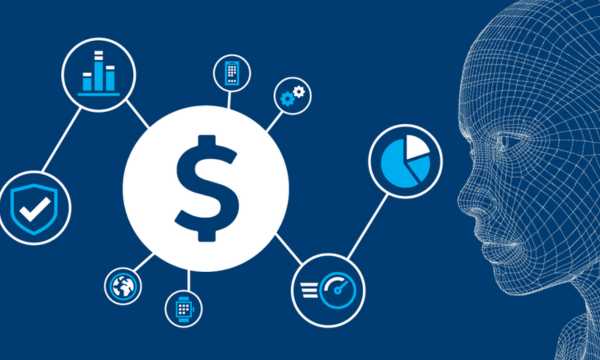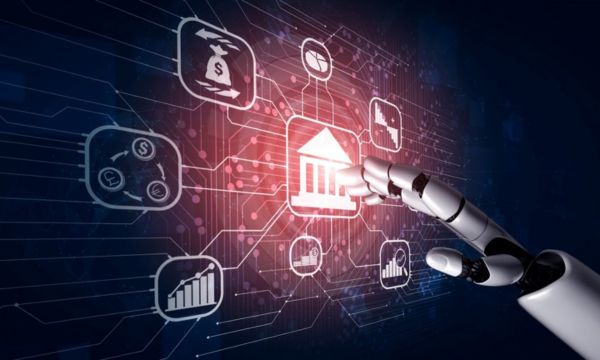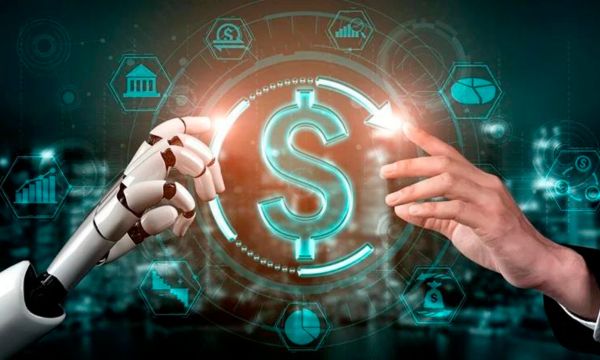The Top 8 AI Finance Trends Dominating 2025
Artificial intelligence (AI) remains a major force behind growth and change in the rapidly changing financial world.
Ad
As 2025 draws to a close, several AI-powered financial trends are becoming increasingly apparent as industry game changers that will impact the way people and businesses use financial services in the future.
This article looks at the eight top AI finance trends of 2025, explaining what they mean and how they could change the financial world.
1. Asset management and Robo-advice
Robo-advisors run by artificial intelligence are getting smarter and can now provide personalized investment advice for less money than traditional financial advisors. By 2025, these platforms will do more than just manage assets.
They also offer comprehensive financial planning services, with algorithms that can help with things like retirement planning, tax minimization, and estate planning.
2. Automated trading system
Automated trading systems, powered by artificial intelligence, are transforming the stock market by executing trades with speed and accuracy that humans cannot match. These systems are based on complex algorithms that view market data, make estimates, and place trades in real-time.
This trend makes high-frequency trading technology more accessible to everyone. Previously, only hedge funds and institutional investors had access to it.
3. Better security and fraud detection
Artificial intelligence makes it easier to detect fraud and secure banking systems. Machine learning algorithms can spot trends and outliers that indicate fraud and can be adapted to respond to new threats as they emerge.
By 2025, the use of AI-powered security measures to protect against online threats, identity theft, and financial fraud will become commonplace.
4. Different ways of banking
Banks and other financial institutions use artificial intelligence to provide users with a more personalized banking experience.
From chatbots to assist with customer service to personalized product suggestions and financial advice, artificial intelligence is making banks more responsive and able to meet everyone’s needs.
5. Credit risk assessment and management
Artificial intelligence algorithms are changing the way credit risk is assessed, assessing whether someone is trustworthy by looking at both standard data sources and new data sources such as transaction history and social media.
This not only speeds up the credit check process but also gives the unbanked access to financial products.
6. Combine blockchain and AI
When artificial intelligence is combined with blockchain technology, financial activities will be more open, efficient, and secure. Artificial intelligence algorithms are used to view blockchain data, improve smart contract execution, and detect fraudulent transactions on the blockchain.
This makes it easier for normal financial transactions to use the technology.
7. Regulatory Compliance Automation (RegTech)
Artificial intelligence is a very important part of regulatory compliance because it can automate tracking and reporting processes to ensure financial institutions comply with laws and regulations.
RegTech solutions powered by AI make compliance easier and cheaper. This helps agencies keep track of regulatory changes and reduce the risk of non-compliance.
8. Use AI to write policies and process claims
The insurance industry is using artificial intelligence to change the way claims are processed and policies are underwritten. Artificial intelligence algorithms enable more accurate risk assessment and personalized insurance products.
Claims processing systems powered by artificial intelligence shorten settlement times, improve accuracy, and increase customer satisfaction.
The Future of AI in Finance
As these trends demonstrate, AI is more than just a way to improve existing financial services; it is a force that is transforming the financial sector. Artificial intelligence makes banking easier, faster, and more secure by automating complex tasks, making the experience more personal, and improving security.
Looking to the future, the continued use of artificial intelligence in the financial sector appears to offer new opportunities, such as better financial products and services, and even open up entirely new business models.
The widespread use of artificial intelligence in the banking industry raises important questions about data privacy, security, and the right way to use artificial intelligence.
As the industry tackles these issues, it will focus on harnessing the power of AI in smart ways so that everyone in the financial ecosystem can benefit from these technological advances.

Top AI Finance (Source – Google)
Conclusion
Finally, the eight AI-powered financial trends that will rule 2025 demonstrate how AI can dramatically transform financial operations.
As we learn more about the potential of artificial intelligence, it is becoming increasingly clear that the future of finance will be characterized by greater efficiency, more personalized services, and new ways to meet the changing needs of businesses and customers.
The journey of artificial intelligence in finance has only just begun and has not even reached its full potential. This means that the sector has a bright future.
FAQs
1. What advantages do robo-advisors have over regular financial advisors?
Robo-advisors are attractive because they are easy to use, cheap, and can provide personalized financial advice based on algorithms.
They are open 24 hours a day, 7 days a week, and can process large amounts of data to make accurate investment decisions. This makes them an excellent choice for both experienced and new investors.
2. How does a standalone trading system work?
Automated trading systems use artificial intelligence algorithms to assess market data, find trading opportunities, and place trades at the best times without human assistance.
They can process complex strategies and large amounts of information faster than traders.
3. Can AI eliminate all security risks and financial fraud?
While AI makes it easier to detect and stop fraud and security threats, it cannot eliminate them. Cyber threats are constantly changing and while AI systems are good at spotting fraud trends, they must keep up with the new tricks used by fraudsters.
4. How can personalized banking help people?
Artificial intelligence is used to personalize banking to ensure that services and products are tailored to the needs, preferences, and financial habits of each individual.
This can improve the overall banking experience by providing more relevant product recommendations, bots that provide better customer service, and financial advice that aligns with personal goals.
5. Are AI tests to monitor credit risk fair?
AI credit risk assessment tries to be more inclusive by looking at different types of data. This can lead to more accurate assessments than the standard model.
But how fair it is depends on the algorithm used and the data being learned. We do a lot of work to ensure these models don’t increase bias.
6. What problems could arise when blockchain and artificial intelligence are combined in the financial world?
Some of the issues that need to be addressed include protecting data privacy and security, ensuring systems operate according to regulations, and figuring out how to combine two complex technologies.
Since these technologies are used for regular banking transactions, they need to be able to handle more users and increase productivity.
 Financial Consulting with AI: Improving Your Finances
Financial Consulting with AI: Improving Your Finances
A new era of financial management is dawning, powered by artificial intelligence. Ad By harnessing sophisticated algorithms […]
More How AI Detects Financial Fraud and Why It Matters
How AI Detects Financial Fraud and Why It Matters
While the digital age has made financial transactions easier and more efficient, it has also led to […]
More 8 Reasons Why AI Finance is Your Key to Financial Freedom
8 Reasons Why AI Finance is Your Key to Financial Freedom
Artificial intelligence (AI) is becoming a major force in the rapidly changing world of financial services, transforming […]
More